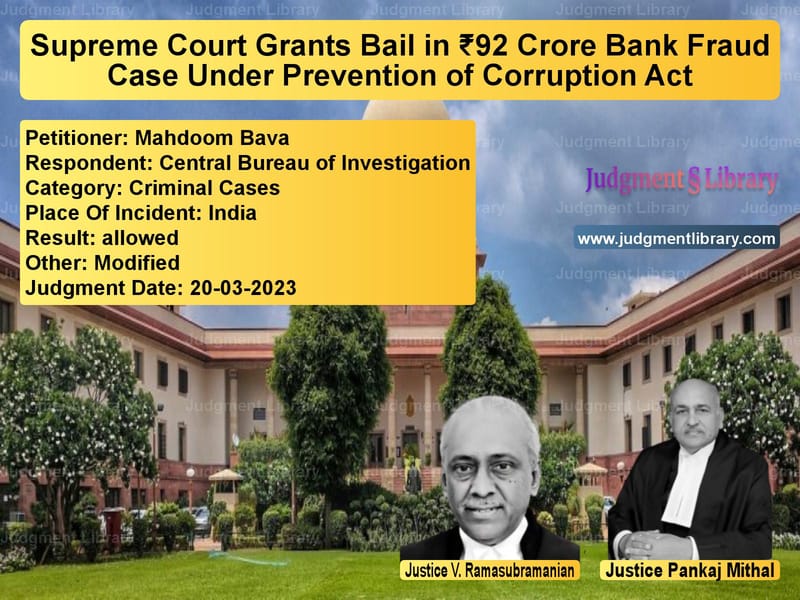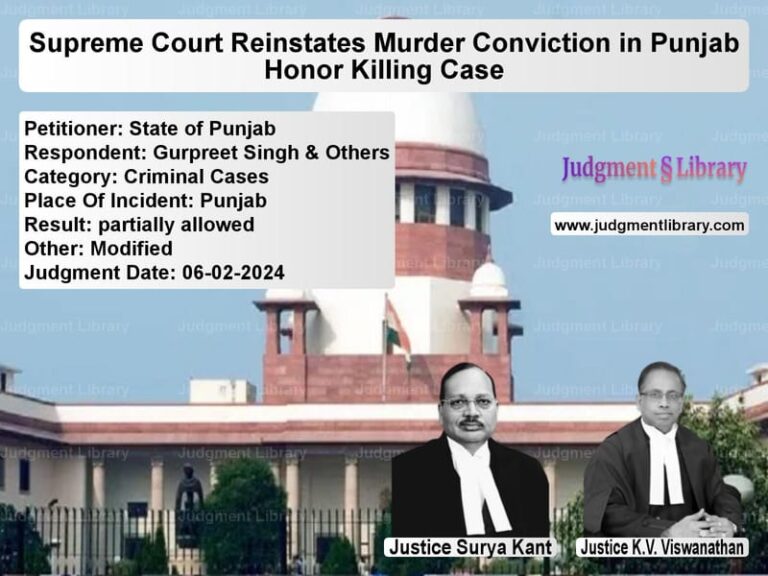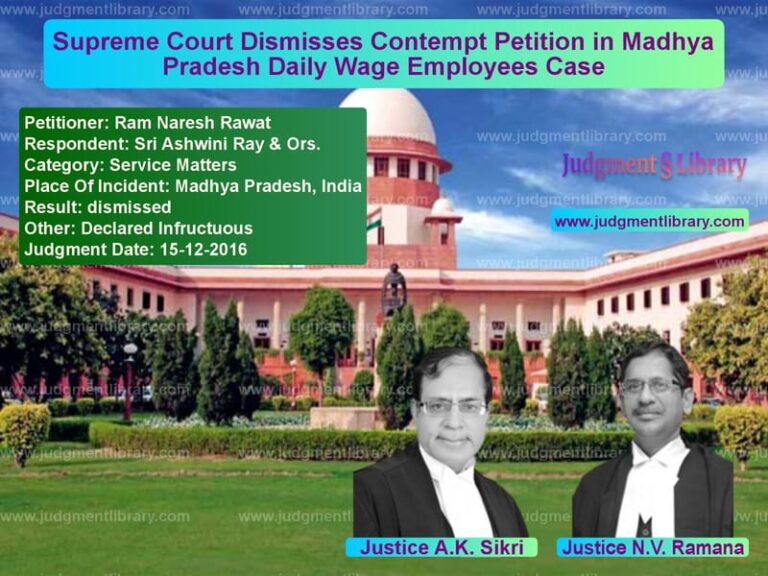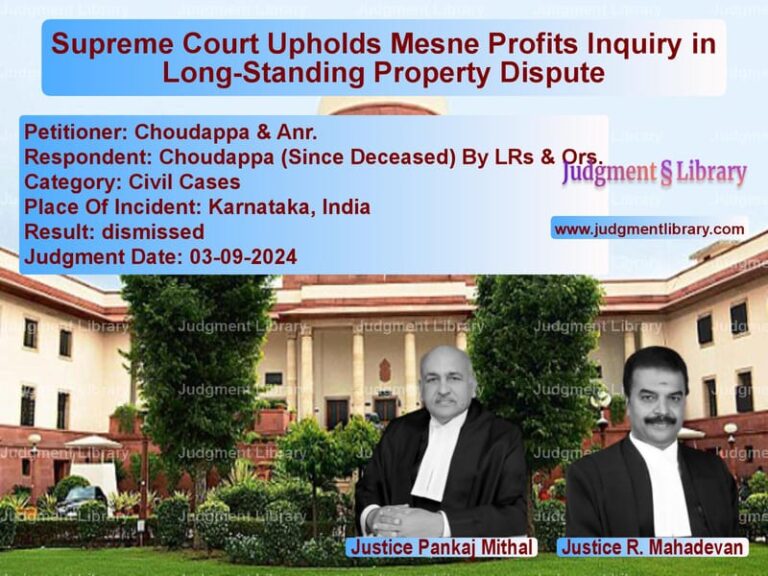Supreme Court Grants Bail in ₹92 Crore Bank Fraud Case Under Prevention of Corruption Act
The case of Mahdoom Bava vs. Central Bureau of Investigation pertains to a large-scale bank fraud involving a loan default of ₹92 crores, investigated under the Prevention of Corruption Act, 1988 and the Indian Penal Code. The Supreme Court, in its ruling, granted bail to the accused, recognizing that the trial was primarily based on documentary evidence and that custodial interrogation was unnecessary.
Background of the Case
The case revolves around an alleged bank fraud where NaftoGaz India Pvt. Ltd. secured a loan from a consortium of banks led by the State Bank of India. The fraud was detected when the company defaulted on its repayments, and subsequent investigations revealed misrepresentation of property values, fictitious documents, and diversion of funds.
Key events leading to the dispute:
- June 29, 2019: The Central Bureau of Investigation (CBI) registered an FIR based on a complaint by Corporation Bank.
- 2019-2021: The accused cooperated with the investigation; no arrests were made.
- December 31, 2021: The CBI filed its final report.
- March 7, 2022: The Special Court issued summons to the accused.
- 2022: The accused applied for anticipatory bail, which was rejected by both the Special Court and the High Court.
- March 20, 2023: The Supreme Court granted bail.
Charges Against the Accused
The accused faced multiple charges under the Indian Penal Code (IPC) and the Prevention of Corruption Act, 1988, including:
- Section 420 (Cheating and dishonestly inducing delivery of property)
- Sections 467, 468, 471 (Forgery and using forged documents as genuine)
- Section 120B (Criminal conspiracy)
- Section 13(2) read with Section 13(1)(d) of the Prevention of Corruption Act
Arguments by the Petitioner (Accused)
The petitioners, including accused persons Mahdoom Bava, Deepak Gupta, Akash Gupta, and Yatish Sharma, contended that:
- They had never been taken into custody during the investigation.
- They had fully cooperated with the CBI throughout the investigation.
- The case was based on documentary evidence, and their arrest was unnecessary.
- There was no direct evidence linking them to fraudulent transactions.
- Most of the alleged fraudulent transactions occurred between 2009 and 2013, and there was an unjustified delay in prosecution.
Arguments by the Respondent (CBI)
The CBI opposed the bail plea on the following grounds:
- The accused played an active role in the fraudulent loan transactions.
- One of the accused, Deepak Gupta, had pledged properties with defective titles.
- Fake invoices and lorry receipts were created to misrepresent trade transactions.
- The money was transferred to shell companies operated by the accused.
- There was a risk that the accused might tamper with evidence if granted bail.
Supreme Court’s Judgment
The Supreme Court ruled in favor of the accused and granted bail, highlighting key considerations:
1. Custodial Interrogation Was Not Required
The Court noted that the accused had cooperated with the investigation for over three years and had never been arrested.
“It is difficult to accept the contention that at this stage the custody of the appellants may be required.”
2. Documentary Nature of Evidence
The Court emphasized that the case was primarily based on documents, making pre-trial detention unnecessary.
“When the primary focus is on documentary evidence, we fail to understand as to why the appellants should now be arrested.”
3. Delay in Prosecution
The Court observed that the alleged fraudulent transactions took place over a decade ago and that the delay weighed in favor of the accused.
“All transactions out of which the complaint had arisen seem to have taken place during 2009-2013.”
4. Accused’s Apprehension of Trial Court Custody
The Court acknowledged that the accused feared remand upon appearing in response to summons.
“The appellants apprehend arrest, not at the behest of the CBI, but at the behest of the Trial Court.”
Final Ruling
The Supreme Court:
- Allowed the appeal and granted bail.
- Directed the accused to surrender their passports.
- Imposed conditions to ensure cooperation with the trial.
Implications of the Judgment
This ruling has significant implications for corporate fraud investigations:
1. Establishing Precedents for Bail in Economic Offenses
- Clarifies that pre-trial detention should not be imposed where documentary evidence suffices.
- Prevents unnecessary incarceration in complex financial crimes.
2. Reinforcing the Need for Speedy Trials
- Highlights the delay in prosecution as a valid ground for bail.
- Encourages courts to ensure timely trials in economic offenses.
3. Balancing Investigation and Personal Liberty
- Recognizes the right of accused persons to a fair trial.
- Ensures cooperation with the trial without unnecessary imprisonment.
Conclusion
The Supreme Court’s ruling in Mahdoom Bava vs. CBI underscores the importance of balancing investigative needs with individual liberty. While financial crimes require thorough scrutiny, indefinite incarceration without necessity is unjust. The ruling serves as a precedent in corporate fraud cases, ensuring fairness and due process.
Petitioner Name: Mahdoom Bava.Respondent Name: Central Bureau of Investigation.Judgment By: Justice V. Ramasubramanian, Justice Pankaj Mithal.Place Of Incident: India.Judgment Date: 20-03-2023.
Don’t miss out on the full details! Download the complete judgment in PDF format below and gain valuable insights instantly!
Download Judgment: mahdoom-bava-vs-central-bureau-of-in-supreme-court-of-india-judgment-dated-20-03-2023.pdf
Directly Download Judgment: Directly download this Judgment
See all petitions in Fraud and Forgery
See all petitions in Money Laundering Cases
See all petitions in Bail and Anticipatory Bail
See all petitions in Extortion and Blackmail
See all petitions in Attempt to Murder Cases
See all petitions in Judgment by V. Ramasubramanian
See all petitions in Judgment by Pankaj Mithal
See all petitions in allowed
See all petitions in Modified
See all petitions in supreme court of India judgments March 2023
See all petitions in 2023 judgments
See all posts in Criminal Cases Category
See all allowed petitions in Criminal Cases Category
See all Dismissed petitions in Criminal Cases Category
See all partially allowed petitions in Criminal Cases Category







